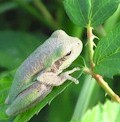Impaction is a condition that affects reptiles. It is a common problem in geckos and Bearded dragons, although can occur in most reptiles. It is when a foreign object that it cannot digest becomes blocked in the digestive tract. It can, if not treated, be fatal.
Causes of impactionImpaction is caused by swallowing objects that the animal cannot digest, such as substrate plastic plants and unsuitable food items. Most commonly they are swallowed by accident, when the reptile attacks prey. Mostly sand, small rocks and parts of decor are to blame as they aren't something you'd think your lizard would eat, even accidentally! Giving the wrong type of food at the wrong stages is also a threat.
Preventing impactionThe first line of defense against impaction is prevention. Don't use fine sands with young geckos or beardies; instead use chunky wood based substrate, ceramic, newspaper or slate that is labelled suitable. Avoid calcium sand with young geckos too; as they will ingest it to get the nutrients from it, unfortunately they can't fully digest it leading to a risk of impaction. You can supply a small bowl of calcium supplement for the young gecko to dip into from time to time.
Be careful with your decor, especially with young lizards. Quite often the young reptile will mistake the authentic looking leaves for real vegetation! Although most reptile decor is durable enough to withstand this attack, aquarium decor or old decor may not. Checking that there are no bits coming off of plastic plants is a good routine to get into, better still avoid plastic plants all together until your reptile is bigger.
Food items can also pose a problem. Harder foods are often a problem for younger lizards, especially geckos. Avoid black crickets (sometimes called field crickets) and mealworms until the animal is older. Instead feed brown crickets and wax worms, which do not have the hard casing black crickets and mealworms have, which can cause impaction.
How do I know if my pet is impacted?Usually refusal to eat is the first sign. However this shouldn't be taken as a symptom alone, many reptiles go off food for periods of time and sometimes it may be down to the wrong environment. So the next symptom is to see if your pet has been passing regularly. If not at all or infrequently you should check the abdomen, which may be swollen, distended, black or blue colored or puffy. Your pet may also seem sluggish, hiding up and refusing to drink.
I think my pet may be impacted, what do I do now?Firstly, don't keep feeding, as the reptile is unlikely to take food. If he or she feels better they might but that doesn't mean the impaction is cleared and therefore may add to the problem. Secondly you will need to bathe your pet. Take a shallow dish, separate container (or if your reptile is large, even a bath!) and fill it just enough to rest the reptile comfortably in. The water needs to room temperature. Allow it to soak for 10 to 15 minutes; this should encourage the reptile to pass waste and the impaction along with it. You can do this twice a day, but if in a couple of days nothing has happened it may be best to seek a vet's advice.
